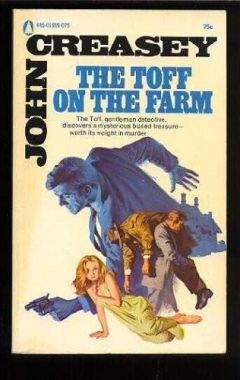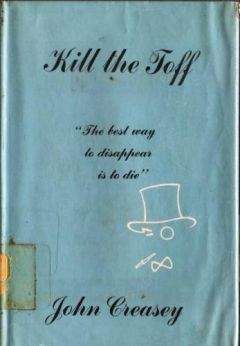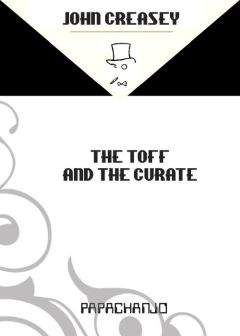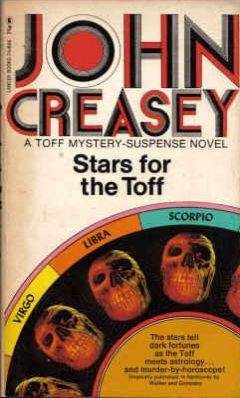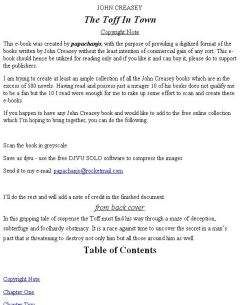John Creasey - The Toff And The Stolen Tresses
На сайте mybooks.club вы можете бесплатно читать книги онлайн без регистрации, включая John Creasey - The Toff And The Stolen Tresses. Жанр: Прочее издательство неизвестно,. Доступна полная версия книги с кратким содержанием для предварительного ознакомления, аннотацией (предисловием), рецензиями от других читателей и их экспертным мнением.
Кроме того, на сайте mybooks.club вы найдете множество новинок, которые стоит прочитать.
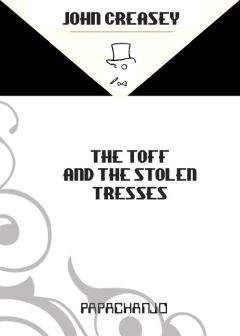
John Creasey - The Toff And The Stolen Tresses краткое содержание
The Toff And The Stolen Tresses читать онлайн бесплатно
He looked up.
The advance guard of the youths were only a few yards away.
“This man isn’t dead,” Rollison said crisply. “He’s got a good chance if we hurry. Who has a bike?” One youth opened his mouth as if to say “I have’ and Rollison didn’t wait for him to change his mind. “You go and see if Dr. Scott’s in, quick. If he’s not, get Dr. Murphy. Anyone else here with a bike?” No one answered this time, and the first youth hesitated. Then Rollison recognised a little whippet of a boy, not vicious but easily led, and one of the fastest milers in the East End of London. “Here, Rolly, you beat all Olympic records up to the Blue Dog, the nearest telephone. Dial 999 and ask for an ambulance. Let’s see if you can still run!”
The youths wavered.
One of the women shouted at them: “What are you standing there for?”
That worked the miracle.
The youths turned and hurried, Rolly to run like a deer, with nothing in his mind but accepting the challenge, the other to leap on his bicycle as if his life depended on it, and pedal off furiously.
Rollison turned to the woman who had come first, and who was now silent.
“Do you live just here?”
She gave a quick, reluctant kind of nod, as if surprised into acknowledging the question.
“Wonderful! Get some blankets and a couple of hot water bottles, and put a couple of kettles on. They might come in useful.” Rollison was still on one knee beside the injured man, and he looked back at him as if taking it for granted that the woman would obey.
She did.
The danger had passed.
Whoever had urged and almost certainly bribed this East End mob to help against the Toff, had lost the first round. Vicious, spiteful-looking youths, young brutes in a gang and in the right mood, were simply people. Crazy mixed-up kids? Young fools, who needed sharp treatment and firm discipline, who had as much good as bad in them if only it could be brought out. They began to move away, the threatening circle had broken already. The women were back in their houses, and soon one came running with a bright red eiderdown, which looked like the blood of a dozen men as the sunlight streamed upon it. She put it over the injured man and tucked it in, and Rollison stood up, glad to ease his knees. He took a gold case out of his pocket, lit a cigarette, and for the first time wiped his forehead, using the back of his hand. The sweat lay cold on his hand. He drew deeply on the cigarette, then looked at the nearest of three elderly men. Not far away, half a dozen others were running, and behind these Ebbutt came in an old T model Ford, the most ancient in London, and the smartest; the sun was shining brightly on its sky blue sides.
“Who saw that lunatic of a lorry driver?” Rollison asked, as if it did not occur to him that this had been done deliberately. “Anyone get the number?”
No one spoke.
“What happened?” one of the older men asked.
“Damned fool came round that corner as if he was racing at Donnington,” Rollison said. He was smoking more freely, and the tension had gone from his whole body. “The motor cyclist had just passed me. He was looking over his shoulder, or wouldn’t have got in my way. I think he’ll be all right,” he added, “it looks that way to me.” He glanced towards the Model T seeing Ebbutt’s set face as he pulled into the kerb, and then climbed out clumsily. He took the situation in at a glance, and the expression that came to his eyes was one almost of wonderment. Other men from the Blue Dog, all Ebbutt’s cronies, were very near. The last vestige of danger had gone, for all of these men trained in Ebbutt’s gymnasium, and included some of the best boxers in London.
“You all right, Mr. Ar?” Ebbutt sounded incredulous.
“I’m fine, Bill,” said Rollison, but he didn’t smile. “I’m upset because I knocked this chap off his bike, nasty thing to happen. Thank God it wasn’t worse.” He watched other women coming with more blankets, one of them with hot water bottles, and the vixen who had called him murderer was among them, spite forgotten in the instinct to help the injured man.
Then came a police car, speeding, and soon afterwards the ringing of the ambulance bell sounded, while one woman said to another quite clearly:
“Cawse I did see it all from the winder. It wasn’t Mr. Rollison’s fault.”
* * *
Half an hour later, only the police were left at the scene. Rollison slid into the driving seat of the Rolls-Bentley, and smiled at several youngsters who were talking about the car with baited breath. Ebbutt leaned against the door, and asked in a voice which no one outside could hear:
“Wot you going to do now, Mr. Ar?”
“Can you give me the address of Tiny Wallis and Mick Clay?”
“Well, I s’pose I could. They live in the same ‘ouse. Wallis is married, Clay’s a lodger.” Ebbutt paused. “But I dunno whether I should tell you, Mr. Ar. Wot’s on?”
“I just want to find out what makes them tick, and who they’re doing their strong arm stuff for,” said Rollison. “I nearly found out what happens when they tick. They laid that attack on pretty fast.”
“Oh, they’re quick,” Ebbutt said. “Don’t misunderstand me, Mr. Ar, Wallis ain’t a big shot and never will be, but he’s got friends and Clay will do whatever Wallis tells ‘im. A lot of people wouldn’t grass on them because of what might happen afterwards. The worst thing about Wallis and Clay is that they don’t lay off until they’ve really done some damage.”
“Do they always work with Teddy Boys?”
“Usually,” Ebbutt conceded. “The Teddies is easy, they’re always spoiling for a fight. It’s an old technique, Mr. Ar, the boys wait at the corner of a street if Wallis and Clay want to do someone, and make sure they’re not interrupted. Then they always have an alibi laid on.”
“Any idea why they do it?”
“The gospel truth is that I dunno,” confessed Ebbutt, and looked as if he meant it, for he rubbed one cauliflower ear. “I don’t even know that they work for anyone in particular, they just hire themselves out.”
“Do you know who they’ve been working for lately?”
“No, Mr. Ar, I don’t. I ‘eard they’d done a job for old Donny Sampson a couple’ve weeks ago, but that’s as far as I know.”
“I knew that a barber had been attacked,” Rollison said, “but I didn’t think Sampson was in any racket.”
“Well, Donny’s made it pretty clear that he don’t want no one muscling in on his business. Too rich, that’s Donny’s trouble, money’s gone to ‘is ‘ead.” Ebbutt ran his hand over what little hair he had, most of it bristly. “That reminds me, I ought to have a n’aircut. He’s got several branches now, and there’s a manager in each; most of the hair-dressing trade around here is cornered by Donny Sampson. When a barber retires or wants to sell out, Donny buys the business, and he pays a fair price, too. But he won’t allow anyone else to take over any business if he can stop it. The people who’ve been established here for years is okay, he doesn’t attempt to take away their trade, but there’s no room for newcomers.” Ebbutt sniffed. “Okay, provided you don’t beat-up anyone to make ‘em sell.”
“Bill,” said Rollison, very mildly, “do you think I need a hair-cut, too?”
“As a matter of fact,” said Bill Ebbutt, earnestly, “I’ve always thought there was room for another Sweeney Todd. Why don’t you go and see if Donny’s trying to hemmulate Sweeney, Mr. Ar? The worst ‘e can do is cut your froat.”
“Which of the shops does he work at?” asked Rollison.
“Oh, the big one, proper posh place that is, up in the Whitechapel Road. You musta seen it. Ladies and gents like all of them, wigs and toupees and scalp treatment, the whole works. You really going, Mr. Ar?”
“I think so, Bill.”
“Like me to come along?”
“I think I’ll take a desperate chance and go alone,” said Rollison dryly, and switched on the ignition. “I wouldn’t like to say what Jolly will think if they make a mess of my hair.”
“Don’t you worry about that,” said Ebbutt. “Donny’s an artist all right. Well, I’ll be seeing yer, Mr. Ar.” He thrust out a massive hand. “Take care of yourself.”
“You wouldn’t forget that I asked for that address would you?” murmured Rollison.
“Well, I never! ‘Ead like a sieve, that’s me,” said Ebbutt. “Okay, then. They live in the same ‘ouse, at . . .”
Rollison grinned, made a mental note of the address, shook hands with Ebbutt, and drove off. The children waved as he passed by, and several youths at the corner near the Blue Dog looked at him sulkily but without open malice. He turned into the Mile End Road, where the world was normal. A little woman pushing a pram with fair-haired twins in it saw him and waved wildly; but for the Toff, her husband would undoubtedly have been in prison; now he was working steady at the docks.
Rollison drove to Whitechapel Road. Parking wasn’t easy, but he found a spot a hundred yards or so away from Donny’s big establishment. He walked slowly towards it, not worried but curious; had he been followed? As far as he could tell, he had not.
He drew nearer Donny’s, his mind full of the man and what he knew of him. Donny was not a Donald or even donnish. In some way he had acquired the first name of Adonis, perhaps from parents with a wry sense of humour, for photographs proved that Adonis Sampson must have been the ugliest and puniest child born some fifty-five years ago.
He was no longer ugly, but his looks exerted a kind of fascination. He still looked puny, although that was almost certainly deceptive.
His shop was much larger than most along here; in fact two double-fronted shops had been turned into one. The outside was painted pale blue and gold, and it would not have been out of place in New Bond Street. One section of the window was devoted to wigs and toupees and plaits of hair, much like a theatrical wigmakers; another was beautifully dressed to show cosmetics; a third would have graced a hair-dressing salon in the heart of Paris.
Rollison stepped inside.
CHAPTER SIX
Donny
Donny’s was luxury.
Across the road were small, dingy houses with drab curtains and blackened chimney pots. Two doors away was a newsagent’s shop with a window which hadn’t been changed for years, and dust lay thick on the old dummy cigarette cartons. On the nearest corner was a fish and chip shop, with a huge sign reading: FRYING TONIGHT. To the right and the left and all about this district there was the poverty of parts of the East End, and the roughness of most of the rest. No one knew better than Rollison the quality and the oddness of many of the people, or that the squalor remained only in patches; but there was little polish on the East End of London.
Except at Donny’s.
Not far away were London’s docks. Along this very street came lascars and sailors from the four corners of the earth, some drunk, some perverts, some broke, some with money spilling out of their pockets. From the thousands of little houses which rose like mushrooms made of bricks, the stevedores left for their daily work, rough, hardy men whose labour made them dirty and whose wives were often hard put to keep their homes and their families clean. Their only sight of luxury was through a television set and visits to the pictures—except at Donny’s.
It was like stepping out of a coaling barge into a first class liner.
Coming out of a doorway on the right was a little woman with a flushed face, her flowered cotton frock obviously Sunday best, high heeled brown shoes which needed mending, and the look of a poor man’s wife. Her greying hair was a mass of lustrous curls, and a glow in her eyes told of a woman who had realised a dream. She went to a small office with two windows, like a cinema’s cash desk. There a young woman with auburn hair and wearing a pale pink smock sat like a queen.
“Well, ‘ow do I look, dearie?” the flushed-faced woman said.
“You look very nice indeed, Mrs. Taylor,” said the queen behind the desk. “I haven’t seen you looking any better.”
“I will say this,” said the happy-looking woman, “Donny’s boys and girls know their job! Lemme see, two pun fifteen shillings, ain’t it?”
“That’s right, Mrs. Taylor.” The queen spoke like one, too, and contrived to conceal from her customer that she was highly intrigued by the man who had just stepped inside the shop, but had not gone straight into the men’s salon through a door clearly marked: Gentlemen’s Coiffeur. This door like all the doors was painted duck egg blue and gold. The carpet was thick and yielding, and also a pale blue. Around the walls were pictures of film stars with remarkable hair styles, most of them from historical pictures.
The queen handed out five shillings change, smiled sweetly, and said:
“Thank you very much, Mrs. Taylor. You will tell your friends about our special sessions, won’t you, and remind them that you save eight shillings on a permanent wave and one and sixpence on a set if you come between ten and twelve and two-fifteen and four-thirty.”
“You bet I will,” said Mrs. Taylor, and bustled past Rollison.
The girl at the cash desk gave him her sweetest smile.
“Good afternoon, sir.”
“Hallo,” said Rollison, and beamed at her. She looked a little dazzled, as most young women would when the Toff smiled quite like that. “Is Mr. Sampson in?”
“I think he is engaged, sir. The manager of the gentlemen’s department will be very glad to see you, though.”
“I’d like to be done by Mr. Sampson in person,” said Rollison, keeping a straight face. “Ask him if he can fit Mr. Rollison in?”
“Mr. Who, sir?”
“Rollison.”
“R-O-Double-L,” began the girl behaving as if she had never heard of Rollison, which was unusual in this part of Whitechapel and did much to suggest that she had been imported from different climes. Her voice was really pleasant, the refinement not really overdone. She lifted a telephone. “I won’t keep you a moment, sir, if you will please sit down.”
“Thank you,” said Rollison.
He sat in a chair more comfortable than the one at his West End barber’s. By his side was a small table with several magazines, including the Society glossies; every one was the current issue. By the side of these a little journal looked almost pathetically out of place, and because of that he picked it up, and read: The Hair Stylist. He glanced through the poor quality paper at the badly printed heads of women, and came to the back page of the cover, with the announcement of a competition. He read with interest, and into a distant corner of his mind there sank a single fact: that the only condition of entry was that you should have your hair dressed by a member of the Hair Stylists’ Association. That sounded fair enough.
The girl had spoken to at least three people on the telephone, keeping her voice low so that Rollison could not hear her words, and Rollison made no attempt to get nearer. Then he saw her smile, put the receiver down, and lean forward; a pretty thing indeed.
“Mr. Sampson will see you in a very few minutes, Mr. Rollison.”
Похожие книги на "The Toff And The Stolen Tresses", John Creasey
John Creasey читать все книги автора по порядку
John Creasey - все книги автора в одном месте читать по порядку полные версии на сайте онлайн библиотеки mybooks.club.
